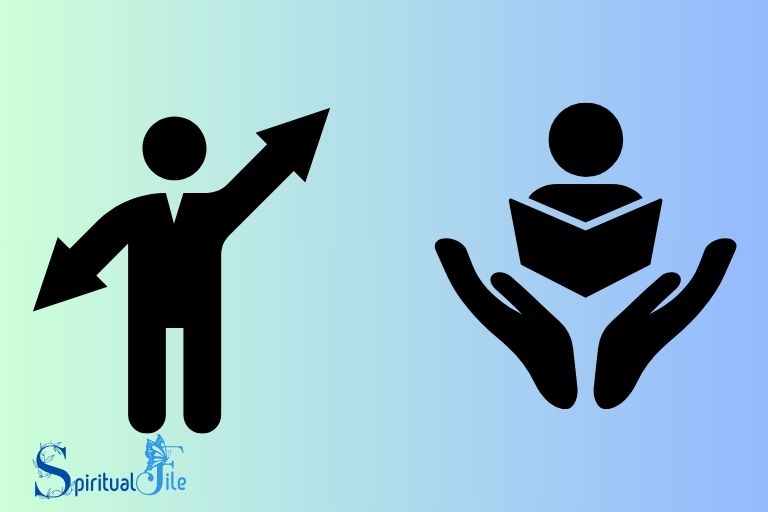Example of Spiritual Direction Session: Involve Prayer!
A spiritual direction session is a meeting between a person seeking guidance (the directee) and a spiritual director.
This meeting may involve prayer, reflection on personal experiences, discernment of spiritual gifts, and discussion about one’s relationship with God.
The goal is to help the directee to deepen their relationship with the divine and live out their faith more fully.
Spiritual direction is a process in which an individual, or directee, meets with a spiritual director for the purpose of reflecting on their spiritual journey.
The spiritual director helps the directee explore their relationship with God or a higher power and find ways to cultivate their spiritual growth. These sessions might take place one-on-one or in a group, in person, on the phone, or online.
In a spiritual direction session, the spiritual director usually starts with a prayer or a moment of silence to create a sacred space. After this, the directee is invited to share what’s been happening in their spiritual life.
The director listens attentively and may ask questions or offer insights to help the directee in their spiritual journey.
The ultimate goal of these sessions is not to give advice, but to help the directee discover and respond to God’s presence and movement in their life.
6 stages of Spiritual Direction Session
| Stages | Description | Activities |
|---|---|---|
| Pre-session Preparation | The stage where the director prepares their mindset for the session. | Brief personal prayer, Self-awareness, Mental clarity. |
| Initial Prayer | The session starts with a prayer. | Director initiates prayer, Invite the directee to join. |
| Checking-In | The phase where the directee shares their feelings, thoughts, and experiences since the last session. | Open ended questions, Active listening, Empathetic responses. |
| Work Phase | The main part of the session, where the directee delves deeper into their spiritual journey. | Deep questioning, Spiritual exercises, Reflection. |
| Termination Phase | The end of the session, where director summarizes the insights and actions for the directee to consider. | Summary of session, Set expectations for the next session, Ending prayer. |
| Post-session Reflection | The director reflects on the session and takes notes for future reference. | Self-evaluation, Notes for future sessions, Personal prayer of gratitude. |
Key Takeaway

Five Facts About: Spiritual Direction Sessions
What Is Spiritual Direction?
Discover the transformative power of spiritual direction. In a session, you can explore your spiritual journey, gain clarity, and find guidance for a more meaningful life.
Spiritual direction is a deeply personal and transformative journey that involves walking alongside a spiritual director who provides guidance and support.
In a spiritual direction session, individuals can explore their connection to the divine, deepen their understanding of themselves, and discover meaning and purpose in their lives.
Definition And Explanation Of Spiritual Direction
- Spiritual direction is a contemplative practice that supports individuals in their spiritual growth and development.
- It is a process of deep listening, reflection, and discernment, where the spiritual director helps the directee explore their concerns, questions, and experiences on a spiritual level.
- The focus of spiritual direction is on nurturing a directee’s relationship with the divine, whatever that may mean to them (god, higher power, universe, etc. ).
- Spiritual direction is not counseling or therapy; rather, it is an opportunity for individuals to engage in self-reflection and connect with their inner wisdom.
- The ultimate goal of spiritual direction is to foster spiritual growth, awareness, and transformation in the directee’s life.
Role Of A Spiritual Director
- A spiritual director is a trained companion who facilitates the spiritual direction process.
- They create a safe and sacred space where the directee can explore their spiritual journey without judgment or agenda.
- A spiritual director listens attentively and deeply, offering a compassionate presence and guiding the conversation with open-ended questions and reflections.
- They help directees discern the movement of the divine in their lives and identify areas of growth, healing, and reconciliation.
- A spiritual director does not provide answers or solutions but encourages the directee to trust their own inner wisdom and intuition.
- They respect and honor the directee’s unique spiritual path and support them in deepening their connection with the divine.
In essence, spiritual direction is a profound and transformative process that offers individuals the opportunity to explore their spirituality, connect with their innermost selves, and cultivate a deeper relationship with the divine.
With the guidance and support of a spiritual director, individuals can embark on a journey of self-discovery, healing, and growth on their path to spiritual wholeness.
Importance Of Spiritual Direction
Spiritual direction is a vital aspect of one’s spiritual journey, providing guidance and support for personal growth and self-discovery.
In a session, a trained spiritual director helps individuals explore their faith, seek clarity, and find meaning in life.
Spiritual direction is a profound and transformative experience that individuals can engage in to deepen their connection with their spiritual path.
Through focused conversations with a trained spiritual director, people can gain valuable insights, guidance, and support as they navigate their spiritual journey.
Let’s explore the importance of spiritual direction and the benefits it offers in terms of personal growth and well-being.
Benefits Of Spiritual Direction For Individuals:
- Self-reflection and self-awareness: Spiritual direction provides individuals with a safe space to reflect on their thoughts, emotions, and experiences, leading to enhanced self-awareness and understanding.
- Guidance and clarity: By engaging in spiritual direction, individuals can receive guidance in discerning and understanding their spiritual experiences, beliefs, and values, leading to greater clarity and purpose in their lives.
- Deepening spiritual practices: Spiritual directors can offer practical tools, techniques, and suggestions to help individuals deepen their spiritual practices such as meditation, prayer, or contemplation.
- Dealing with challenges: Spiritual direction offers support in navigating through challenges, crises, or transitions in life, helping individuals find strength, hope, and renewed meaning in their difficult experiences.
- Enhancing spiritual growth: Through regular spiritual direction sessions, individuals can experience significant personal and spiritual growth, deepening their connection with the divine and expanding their understanding of themselves and the world around them.
Impact On Spiritual Growth And Well-Being:
- Strengthening faith: Spiritual direction aids in strengthening an individual’s faith by encouraging exploration, questioning, and deepening of their beliefs, allowing for a more profound and authentic connection with their spirituality.
- Emotional healing: By providing a compassionate and non-judgmental space, spiritual direction can support individuals in processing and healing emotional wounds, traumas, or past hurts, thus promoting emotional well-being.
- Inner peace and contentment: Engaging in regular spiritual direction sessions can lead to a deep sense of inner peace, contentment, and a greater capacity to experience joy and gratitude in one’s life.
- Connection with others: Spiritual direction can help individuals explore and nurture their relationships with others, fostering empathy, compassion, and a greater sense of interconnectedness.
- Integrating spirituality into daily life: Spiritual direction assists individuals in integrating their spiritual beliefs and practices into their everyday lives, leading to a more authentic and fulfilling way of living.
Spiritual direction holds immense value for individuals seeking to deepen their spiritual connection, find guidance, and experience personal growth and well-being.
Through self-reflection, guidance, and support, spiritual direction helps individuals navigate their spiritual path with clarity, purpose, and inner peace.
The Process Of A Spiritual Direction Session
A spiritual direction session offers a personalized example of spiritual guidance and support. Through deep listening and dialogue, individuals explore their spiritual journey and gain insight into their relationship with higher power.
Experienced spiritual directors facilitate this transformative process, helping seekers find meaning, purpose, and connection in their lives.
Preparation And Setting Intentions:
Before beginning a spiritual direction session, it is essential to take some time for preparation and setting intentions.
This helps create a sacred space for the session and allows both the spiritual director and the directee to align themselves with the purpose of the meeting.
Here’s what typically happens during this phase:
- The spiritual director and the directee may engage in a brief conversation about what the directee hopes to explore or discuss during the session.
- They may take a few moments to center themselves and set their intentions for the session, focusing on openness, presence, and deep listening.
- This phase helps create a nurturing and safe environment for the spiritual direction session, setting the stage for a meaningful and transformative experience.
Opening Prayer Or Meditation:
A spiritual direction session often starts with an opening prayer or meditation. This practice allows both the spiritual director and the directee to connect with their inner selves, the divine, and the intention they have set for the session.
Here’s what commonly takes place during this phase:
- The spiritual director may lead the directee in a brief prayer or meditation, emphasizing mindfulness and a sense of presence.
- This time is dedicated to grounding the participants, creating a sense of sacredness, and inviting the divine presence into the session.
- Opening prayers or meditations can vary depending on the spiritual tradition or personal preferences of the individuals involved. It serves as an anchor and reminder of the spiritual nature of the session.
Sharing And Reflection On Personal Experiences And Challenges:
Once the session is grounded in prayer or meditation, the directee shares personal experiences and challenges while the spiritual director listens deeply and empathetically.
This is a vital part of the spiritual direction process, providing space for self-reflection and growth.
Here’s what typically happens during this phase:
- The directee may express their thoughts, feelings, and experiences related to their spiritual journey, relationships, or any other aspect of their life.
- The spiritual director attentively listens without judgment, providing a safe space for open sharing and emotional exploration.
- Through deep listening, the spiritual director seeks to discern the movements of the divine and the directee’s inner wisdom, allowing for meaningful insights and revelations to arise.
Guidance And Support From The Spiritual Director:
In a spiritual direction session, the spiritual director offers guidance and support, helping the directee gain clarity, perspective, and deeper insights.
Here’s what a spiritual director may do during this phase:
- The spiritual director may ask reflective questions to encourage the directee to explore their experiences from different angles and perspectives.
- They may provide gentle challenges or suggestions to help the directee deepen their spiritual practice or navigate challenging situations.
- The spiritual director acts as a companion and guide, holding the sacred space, and offering wisdom, resources, and practices to help the directee on their spiritual journey.
Closing Prayer Or Meditation:
As the session draws to a close, a closing prayer or meditation brings the session full circle, allowing for reflection, gratitude, and closure.
Here’s what typically takes place during this phase:
- The spiritual director may lead the directee in a short prayer or meditation, inviting them to reflect on the insights gained during the session and express gratitude for the experience.
- This closing practice helps the directee integrate the session’s learnings and carry them forward into their daily lives.
- It also serves as a transition back into the external world, leaving both the spiritual director and the directee with a sense of peace, connection, and purpose.
Remember, a spiritual direction session is a deeply personal and transformative experience.
The process outlined here provides a general framework, but each session is unique and tailored to the individual’s needs and spiritual path.
Exploring Different Approaches In Spiritual Direction
Discover the diverse techniques used during spiritual direction sessions, as an example of exploring different approaches. Gain insights and guidance in a non-judgmental and supportive space.
In the realm of spiritual direction, there are various methods and styles that spiritual directors employ to guide individuals on their spiritual journeys.
These approaches allow for a personalized and tailored experience that caters to individual needs and beliefs. Let’s delve into some of the different approaches used in spiritual direction:
Various Methods And Styles Of Spiritual Direction:
Psychological approach: Some spiritual directors incorporate psychological techniques and theories into their sessions, such as those rooted in freudian or jungian psychology.
This approach explores how psychological and spiritual aspects intertwine and impact one another.
Scriptural approach: In this approach, spiritual directors draw inspiration and guidance from sacred texts and scriptures from various religious traditions.
They help individuals engage with these texts, explore their meaning, and apply the teachings to their own lives.
Ignatian approach: Inspired by the teachings of saint ignatius of loyola, this method emphasizes discernment, imagination, and reflection.
Spiritual directors guide individuals through meditative practices, such as the ignatian examen, to deepen their relationship with god.
Mystical approach: This approach focuses on mystical traditions and practices found in various religions, such as christian mysticism, sufism, or kabbalah.
Spiritual directors facilitate experiences of divine union and connection with the transcendent.
Incorporating Contemplative Practices:
Meditation: Spiritual directors often guide individuals in various forms of meditation, such as mindfulness or centering prayer.
These practices cultivate inner stillness, awareness, and deepen one’s connection to the divine.
Breathwork: Utilizing conscious and intentional breathing techniques, spiritual directors help individuals access states of deep relaxation and mindfulness. This practice enhances self-awareness and enables profound spiritual experiences.
Labyrinth walking: Spiritual directors may encourage individuals to walk labyrinths as a form of meditation and reflection.
Walking the winding paths facilitates a sense of journey and introspection, leading to spiritual insights and renewal.
Tailoring Sessions To Individual Needs And Beliefs:
Openness and respect: Spiritual directors create a safe and non-judgmental space for individuals to explore their beliefs, doubts, and experiences.
They respect diverse spiritual backgrounds and honor each person’s unique path.
Flexible framework: While spiritual directors may have certain frameworks or approaches, they adapt their methods to the specific needs and preferences of each individual.This flexibility ensures that the guidance provided aligns with their spiritual journey.
Collaborative process: Spiritual direction is a collaborative endeavor, with the spiritual director and individual working together to explore questions, insights, and challenges.
This co-creative approach fosters a deeper understanding of one’s spiritual path.
In spiritual direction, various methods, contemplative practices, and tailored sessions support individuals in deepening their spiritual lives.
By embracing different approaches, individuals can find guidance and connection that resonates with their unique needs and beliefs.
Key Elements Of A Successful Spiritual Direction Session
During a successful spiritual direction session, key elements include active listening, open-ended questions, empathy, and creating a safe space for self-exploration.
These sessions provide guidance and support for individuals seeking a deeper understanding of their spirituality.
At the heart of a successful spiritual direction session are several key elements that lay the foundation for meaningful exploration and growth.
These elements include:
Listening And Active Presence
- Attentive listening: The spiritual director practices deep and compassionate listening, allowing the directee to fully express their thoughts, emotions, and experiences.
- Active presence: By being fully present in the moment, the spiritual director creates a safe and supportive space for the directee to explore their spiritual journey.
Creating A Safe And Non-Judgmental Space
- Confidentiality: The spiritual director maintains strict confidentiality, ensuring that trust is nurtured and confidentiality is upheld.
- Non-judgmental attitude: The director approaches the session with an open and non-judgmental mindset, allowing the directee to freely express their beliefs and experiences.
Asking Powerful And Open-Ended Questions
- Powerful questions: The spiritual director employs thought-provoking questions that go beyond surface-level discussions, inspiring the directee to delve deep into their spiritual experiences.
- Open-ended questions: By asking open-ended questions, the director encourages the directee to explore different perspectives and formulate personal insights.
These key elements of a successful spiritual direction session provide a framework that fosters deep exploration, self-awareness, and spiritual growth.
By embodying active listening, creating a safe space, and asking powerful questions, spiritual directors empower their directees on their unique spiritual journey.
Example Of A Spiritual Direction Session
Experience a spiritual direction session where you can embrace self-discovery and explore your spiritual journey with a trained guide.
Dive deep into meaningful conversations that provide guidance, insights, and support along your path of spiritual growth.
In this section, we will explore a hypothetical spiritual direction session, highlighting the detailed description of the session, as well as the insights gained and transformations experienced.
Detailed Description Of A Hypothetical Session
- The session begins with a warm greeting as the spiritual director and seeker settle into a cozy room adorned with calming decor.
- The spiritual director invites the seeker to share any concerns, questions, or experiences that they would like to explore during the session.
- The seeker opens up about their recent struggles with finding purpose and direction in their life and the longing to deepen their spiritual connection.
- The spiritual director attentively listens, providing a safe and non-judgmental space for the seeker to express themselves fully.
- Through gentle probing and insightful questions, the spiritual director encourages the seeker to delve deeper into their thoughts, emotions, and beliefs, fostering self-reflection and introspection.
- Together, they explore various spiritual practices, such as meditation, prayer, or journaling, allowing the seeker to connect more deeply with their inner self and the divine.
- As the session comes to a close, the spiritual director guides the seeker in setting intentions and incorporating spiritual practices into their daily life, empowering them with tools to continue their journey of self-discovery and spiritual growth.
Insights Gained And Transformations Experienced
- The seeker gains a deeper understanding of their core values, desires, and spiritual needs, providing clarity and direction in their life.
- Through self-reflection, the seeker begins to recognize limiting beliefs and patterns that hinder their spiritual growth, enabling them to make conscious choices aligned with their higher purpose.
- The session ignites a sense of spiritual connection and brings forth a feeling of peace, allowing the seeker to tap into a source of inner strength and resilience during challenging times.
- The seeker experiences a renewed sense of purpose and meaning, finding inspiration to live more authentically and in alignment with their beliefs and values.
- The spiritual direction session serves as a catalyst for the seeker’s ongoing spiritual journey, opening doors to explore deeper insights, embrace transformation, and cultivate a profound connection with themselves and the divine.
With the example of this spiritual direction session, it becomes evident how the guidance and support of a trained spiritual director can assist individuals in their pursuit of spiritual growth, self-discovery, and a deeper connection with their inner selves and the divine.
Finding A Spiritual Director
Example of a spiritual direction session involves exploring personal beliefs and experiences with a trusted guide, helping individuals deepen their connection to the divine and find spiritual clarity.
This collaborative journey creates a safe space for self-discovery and nurtures a profound sense of purpose and peace.
Factors To Consider When Choosing A Spiritual Director:
Plain Paragraph:
Finding a spiritual director is an important decision that should be made carefully. There are several factors to consider when choosing a spiritual director that will best fit your personal needs and goals.
- Training and qualifications: Look for a spiritual director who has received proper training and has the necessary qualifications to guide you on your spiritual journey.
- Experience: Consider the experience of the spiritual director, as someone with more experience may have a deeper understanding and insight into various spiritual matters.
- Compatibility: It is important to find a spiritual director with whom you have a good rapport and feel comfortable sharing your thoughts and feelings.
- Spiritual tradition: Consider whether you prefer a spiritual director from a specific tradition or if you are open to someone from a different spiritual background.
- Philosophy and approach: Understand the spiritual director’s philosophy and approach to ensure that it aligns with your own beliefs and goals.
- Availability: Check the availability of the spiritual director to ensure that they can accommodate your schedule and provide regular sessions as needed.
Resources And Directories For Finding Qualified Professionals:
There are various resources and directories available to help you find qualified spiritual directors.
These resources can assist you in locating professionals who have the credentials and experience to guide you in your spiritual journey.
- Local religious organizations: Many religious organizations may have recommendations or resources for finding spiritual directors within their specific tradition.
- Spiritual retreat centers: Retreat centers often have connections with spiritual directors and can provide recommendations or referrals based on your needs.
- Online directories: Explore online directories that specifically focus on spiritual directors, providing listings and information about their background and qualifications.
- Referrals: Seek recommendations from friends, family, or other trusted individuals who have previously worked with a spiritual director.
- Professional associations: Look for professional associations or organizations dedicated to spiritual direction that maintain directories of qualified spiritual directors.
- Local spiritual communities: Attend local spiritual gatherings or events where you can connect with like-minded individuals who may be able to recommend a spiritual director.
Remember, finding a spiritual director is a personal process, so take your time to research and consider your options before making a decision.
The right spiritual director can provide guidance and support as you explore and deepen your spiritual path.
How Can Prayer be Incorporated into the Spiritual Life Map Example?
Prayer can be integrated into a spiritual life map example in various ways. It can serve as a key navigation tool, guiding individuals along their journey and providing direction and insight. By incorporating regular prayer practices into the spiritual life map example, individuals can deepen their connection with their faith and purpose.
FAQ About Example Of Spiritual Direction Session
What Are Examples Of Spiritual Direction?
Examples of spiritual direction include regular meetings with a spiritual director, exploring life’s meaning and purpose, and deepening one’s relationship with god.
Spiritual direction involves discussing personal experiences, emotions, and questions related to spirituality.
It can also include prayer, meditation, and reflection to foster spiritual growth.
Additionally, spiritual direction can help individuals discern important life decisions and navigate difficult circumstances.
Through careful listening and guidance, spiritual directors help individuals connect with their inner wisdom, awaken to the divine presence, and find clarity and direction on their spiritual journeys.
Spiritual direction can take many forms and may vary depending on the individual’s religious or philosophical beliefs.
Ultimately, spiritual direction aims to provide support, encouragement, and guidance in deepening one’s connection with the spiritual dimension of life.
What Do You Say During Spiritual Direction?
During spiritual direction, you express your thoughts, feelings, and experiences to a trained spiritual guide.
This process helps you explore your relationship with god, deepen your spiritual life, and gain clarity on spiritual matters. You discuss your prayer life, experiences of consolation or desolation, and discernment of god’s will.
The spiritual guide actively listens, asks questions, and provides insights and guidance based on their expertise and understanding of spirituality.
They may offer suggestions for prayer methods, offer spiritual practices, and help you identify any obstacles or patterns that hinder your spiritual growth.
The conversation is confidential and non-judgmental, allowing you to freely share your concerns, doubts, and joys.
Remember, spiritual direction is a collaborative process where you actively engage in self-reflection and seek guidance to nurture your spiritual journey.
How Is Spiritual Direction Done?
Spiritual direction is a contemplative practice led by a trained guide who offers support, wisdom, and guidance on your spiritual journey.
It involves deep listening, compassionate presence, and open-ended questions to help you explore your relationship with the divine and gain insights into your spiritual growth.
The process typically begins with an initial meeting to clarify your intentions and establish trust with your spiritual director.
Subsequent sessions, usually once a month, provide a safe and confidential space for you to share your experiences, concerns, and joys.
The spiritual director actively listens, reflects back what they hear, and helps you discern the movements of the divine in your life.
By engaging in spiritual direction, you can deepen your awareness of god’s presence, discern your spiritual path, and find nourishment for your soul.
What Is A Spiritual Direction Program?
A spiritual direction program is a guided process that helps individuals deepen their spiritual journey and connection with a higher power.
It offers a safe and confidential space for individuals to explore their spiritual beliefs, questions, and experiences.
Through regular sessions with a trained spiritual director, participants can gain clarity, insight, and direction in their spiritual growth.
The program may involve various practices such as prayer, meditation, reflection, and discernment. Participants are encouraged to reflect on their life experiences, relationships, and emotions, and how these intersect with their spirituality.
The spiritual director provides guidance, support, and accountability, helping individuals to discern and follow their unique path towards spiritual fulfillment and transformation.
Overall, a spiritual direction program can be a valuable resource for those seeking to deepen their spiritual connection, cultivate inner peace, and align their lives with their spiritual values.
What Happens During A Spiritual Direction Session?
During a spiritual direction session, you will have the opportunity to explore your spiritual journey in a supportive and non-judgmental space.
Conclusion
An example of a spiritual direction session provides insight into the transformative power of connecting with a spiritual guide.
By engaging in this collaborative process, individuals can gain a deeper understanding of their spiritual beliefs, connect with their inner selves, and find guidance in navigating life’s challenges.
Throughout the session, the spiritual director offers a safe and non-judgmental space for exploration, actively listening and asking thoughtful questions to help the seeker gain clarity and perspective.
The session may involve prayer, meditation, and reflection, empowering individuals to tap into their own inner wisdom.
Ultimately, spiritual direction encourages personal growth, authentic connection with the divine, and the fulfillment of one’s unique spiritual journey.
Whether you are seeking solace, direction, or a deeper connection with your spirituality, a spiritual direction session can be a valuable tool for self-discovery and spiritual development.
Embark on this transformative journey and unlock the limitless possibilities within yourself.





